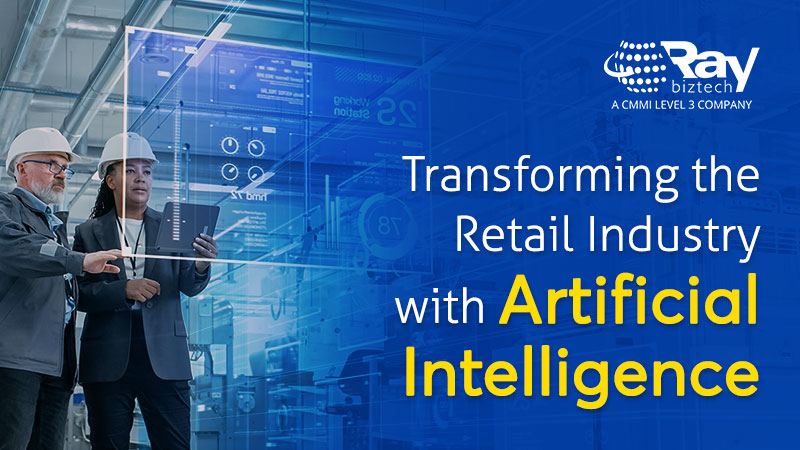Transforming the Retail Industry with Artificial Intelligence

Artificial Intelligence (AI) has emerged as a game-changer across various sectors including the retail industry. The integration of AI in retail is revolutionizing the way businesses operate, enhancing customer experiences, and optimizing supply chain management. This blog explores the huge impact of AI on the retail industry, highlighting key applications & benefits.
Enhancing Customer Experience
Personalized Shopping Experiences
One of the most significant advantages of AI in retail is the ability to provide personalized shopping experiences. AI algorithms analyze customer data, including browsing history, purchase patterns, and preferences, to offer tailored product recommendations. This level of personalization not only improves customer satisfaction but also drives sales and boosts customer loyalty
Virtual Assistants and Chatbots
AI-powered virtual assistants & chatbots are transforming customer service in retail. These tools provide instant support to customers, answering queries, assisting with product searches, and even processing orders. By leveraging natural language processing (NLP) and machine learning, virtual assistants can understand and respond to customer inquiries in real-time, ensuring a seamless shopping experience. This uninterrupted 24/7 availability not only enhances customer satisfaction but also minimizes the workload on human customer service executives.
Optimizing Supply Chain Management
Demand Forecasting
Accurate demand forecasting is key for effective inventory management. AI-driven analytics can predict future demand based on historical data, seasonal trends, and market conditions. This enables retailers to optimize their stock levels, reduce excess inventory, and minimize stockouts. Improved demand forecasting leads to better resource allocation, cost savings, and a more responsive supply chain.
Inventory Management
AI solutions are revolutionizing inventory management by providing real-time visibility into stock levels and automating replenishment processes. Smart shelves and IoT devices track inventory in real-time, alerting managers when stock is low or when items are misplaced. This reduces the chances of human error and ensures that products are always available on the shelves. Moreover, AI-driven inventory management systems can analyze sales data and customer behavior to optimize product placement and shelf space, maximizing sales and enhancing the overall shopping experience.
Improving Operational Efficiency
Automated Checkout Systems
Long checkout lines are the common pain point for customers. AI-powered automated checkout systems eliminate this issue by allowing customers to simply pick up items and leave the store. These systems use sensor fusion, computer vision, and deep learning to track items and automatically charge the customer’s account. This not only speeds up the checkout process but also reduces the need for cashiers, thereby cutting labor costs.
Robotic Process Automation (RPA)
RPA is an area where AI is driving operational efficiency in retail. RPA can automate repetitive and time-consuming tasks such as order processing, invoice management, and data entry. This frees up employees to focus on more strategic activities and improves overall productivity. Retailers can achieve significant cost savings and operational efficiencies by integrating RPA into their business processes.
Enhancing Marketing Strategies
Predictive Analytics
AI-powered predictive analytics enable retailers to make data-driven marketing decisions. By analyzing customer data and market trends, AI can predict which products are likely to be popular, identify potential customer segments, and determine the most effective marketing channels. This allows retailers to imrove their marketing campaigns for maximum impact, improving their customer engagement and driving sales.
Sentiment Analysis
Understanding customer sentiment is vital for effective marketing. AI-driven sentiment analysis tools scan social media, reviews, and other online content to gauge customer opinions and emotions. This provides retailers with valuable insights into customer perceptions of their brand and products, allowing them to adjust their marketing strategies accordingly. By addressing customer concerns and highlighting positive feedback, retailers can build stronger relationships with their customers and enhance their brand image.
The Future of AI in Retail
The potential of AI in retail is vast and continues to evolve. Emerging technologies such as augmented reality (AR), virtual reality (VR), and blockchain are expected to further transform the retail landscape. For instance, AR and VR can create immersive shopping experiences, allowing customers to virtually try on clothes or visualize furniture in their homes. Meanwhile, blockchain technology can enhance transparency and security in supply chains, building greater trust with customers.
As AI technology advances, retailers must stay ahead of the curve by adopting innovative solutions that enhance customer experiences, optimize operations, and drive growth. However, navigating the difficulties of AI implementation requires expertise & strategic planning.
About Ray Business Technologies
RBT provides specialized AI consulting services customized to meet the unique requirements of each client. Our team of experts helps retailers harness the power of AI to transform their businesses, from enhancing customer experiences to optimizing supply chain management. Partner with RBT to stay ahead in the competitive retail industry and unlock the full potential of AI for your business.

